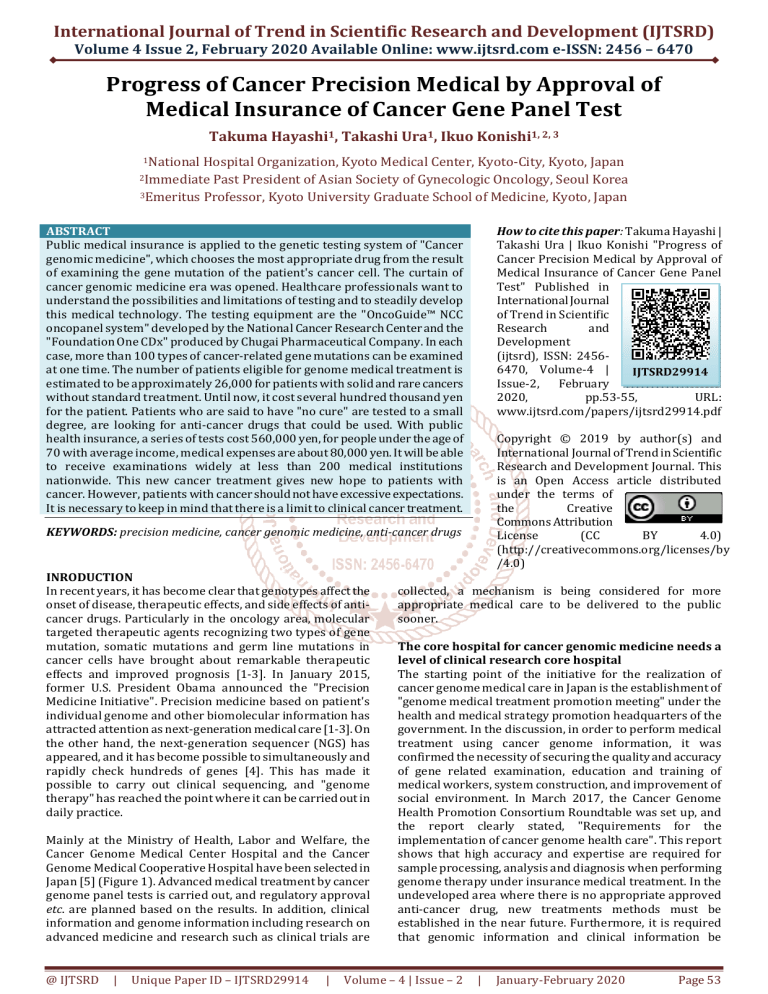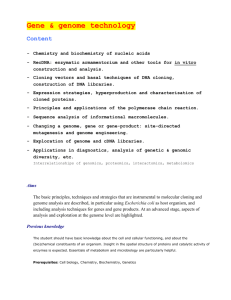
International Journal of Trend in Scientific Research and Development (IJTSRD)
Volume 4 Issue 2, February 2020 Available Online: www.ijtsrd.com e-ISSN: 2456 – 6470
Progress of Cancer Precision Medical by Approval of
Medical Insurance of Cancer Gene Panel Test
Takuma Hayashi1, Takashi Ura1, Ikuo Konishi1, 2, 3
1National
Hospital Organization, Kyoto Medical Center, Kyoto-City, Kyoto, Japan
Past President of Asian Society of Gynecologic Oncology, Seoul Korea
3Emeritus Professor, Kyoto University Graduate School of Medicine, Kyoto, Japan
2Immediate
ABSTRACT
Public medical insurance is applied to the genetic testing system of "Cancer
genomic medicine", which chooses the most appropriate drug from the result
of examining the gene mutation of the patient's cancer cell. The curtain of
cancer genomic medicine era was opened. Healthcare professionals want to
understand the possibilities and limitations of testing and to steadily develop
this medical technology. The testing equipment are the "OncoGuide™ NCC
oncopanel system" developed by the National Cancer Research Center and the
"Foundation One CDx" produced by Chugai Pharmaceutical Company. In each
case, more than 100 types of cancer-related gene mutations can be examined
at one time. The number of patients eligible for genome medical treatment is
estimated to be approximately 26,000 for patients with solid and rare cancers
without standard treatment. Until now, it cost several hundred thousand yen
for the patient. Patients who are said to have "no cure" are tested to a small
degree, are looking for anti-cancer drugs that could be used. With public
health insurance, a series of tests cost 560,000 yen, for people under the age of
70 with average income, medical expenses are about 80,000 yen. It will be able
to receive examinations widely at less than 200 medical institutions
nationwide. This new cancer treatment gives new hope to patients with
cancer. However, patients with cancer should not have excessive expectations.
It is necessary to keep in mind that there is a limit to clinical cancer treatment.
How to cite this paper: Takuma Hayashi |
Takashi Ura | Ikuo Konishi "Progress of
Cancer Precision Medical by Approval of
Medical Insurance of Cancer Gene Panel
Test" Published in
International Journal
of Trend in Scientific
Research
and
Development
(ijtsrd), ISSN: 24566470, Volume-4 |
IJTSRD29914
Issue-2, February
2020,
pp.53-55,
URL:
www.ijtsrd.com/papers/ijtsrd29914.pdf
Copyright © 2019 by author(s) and
International Journal of Trend in Scientific
Research and Development Journal. This
is an Open Access article distributed
under the terms of
the
Creative
Commons Attribution
License
(CC
BY
4.0)
(http://creativecommons.org/licenses/by
/4.0)
KEYWORDS: precision medicine, cancer genomic medicine, anti-cancer drugs
INRODUCTION
In recent years, it has become clear that genotypes affect the
onset of disease, therapeutic effects, and side effects of anticancer drugs. Particularly in the oncology area, molecular
targeted therapeutic agents recognizing two types of gene
mutation, somatic mutations and germ line mutations in
cancer cells have brought about remarkable therapeutic
effects and improved prognosis [1-3]. In January 2015,
former U.S. President Obama announced the "Precision
Medicine Initiative". Precision medicine based on patient's
individual genome and other biomolecular information has
attracted attention as next-generation medical care [1-3]. On
the other hand, the next-generation sequencer (NGS) has
appeared, and it has become possible to simultaneously and
rapidly check hundreds of genes [4]. This has made it
possible to carry out clinical sequencing, and "genome
therapy" has reached the point where it can be carried out in
daily practice.
Mainly at the Ministry of Health, Labor and Welfare, the
Cancer Genome Medical Center Hospital and the Cancer
Genome Medical Cooperative Hospital have been selected in
Japan [5] (Figure 1). Advanced medical treatment by cancer
genome panel tests is carried out, and regulatory approval
etc. are planned based on the results. In addition, clinical
information and genome information including research on
advanced medicine and research such as clinical trials are
@ IJTSRD
|
Unique Paper ID – IJTSRD29914
|
collected, a mechanism is being considered for more
appropriate medical care to be delivered to the public
sooner.
The core hospital for cancer genomic medicine needs a
level of clinical research core hospital
The starting point of the initiative for the realization of
cancer genome medical care in Japan is the establishment of
"genome medical treatment promotion meeting" under the
health and medical strategy promotion headquarters of the
government. In the discussion, in order to perform medical
treatment using cancer genome information, it was
confirmed the necessity of securing the quality and accuracy
of gene related examination, education and training of
medical workers, system construction, and improvement of
social environment. In March 2017, the Cancer Genome
Health Promotion Consortium Roundtable was set up, and
the report clearly stated, "Requirements for the
implementation of cancer genome health care". This report
shows that high accuracy and expertise are required for
sample processing, analysis and diagnosis when performing
genome therapy under insurance medical treatment. In the
undeveloped area where there is no appropriate approved
anti-cancer drug, new treatments methods must be
established in the near future. Furthermore, it is required
that genomic information and clinical information be
Volume – 4 | Issue – 2
|
January-February 2020
Page 53
International Journal of Trend in Scientific Research and Development (IJTSRD) @ www.ijtsrd.com eISSN: 2456-6470
collected and analyzed for the development of cancer
genome medicine.
The Sub Working Group on the Requirements for Designated
Centers for Cancer Genome Medicine Core Hospitals
considered the specific requirements of core hospitals that
mainly implement genome medicine. The developmental
medical care is needed in this field of cancer medical care.
Therefore, if there is a need to give superiority or inferiority
at the time of screening from among medical institutions that
meet the specified requirements, the institutions, which can
implement safely new anti-cancer drugs, unapproved drugs,
and clinical research for off-label use in compliance with the
law, are selected. Such a system is particularly important. In
other words, core hospitals are required to have functions
and capabilities comparable to those of clinical research core
hospitals. In addition, as there are few human resources who
are familiar with genome medicine at present, human
resource development in each field is also required. The
training situation of human resources, the maintenance
situation of facilities is examined, and re-examination of
designated requirements and facility expansion are
considered in two years after the first authorization. In 2019,
core hospitals and cooperative hospitals were selected in
consideration of regional characteristics. Cancer genome
medicine is implemented in clinical medicine, though
limited. Not only adults but also childhood cancer have to be
covered, and the Children's Cancer Center Hospital is a
candidate for implementation.
Receive insurance approval for panel genetic testing and
conduct advanced medicine
On May 29, 2019, the Ministry of Health, Labor and Welfare
decided the rules using the "OncoGuide™ NCC oncopanel
system" developed by the National Cancer Research Center
at Tokyo, Japan and the "FoundationOne CDx" produced by
Chugai Pharmaceutical Company at Tokyo, Japan [6]. The
"Genome Cancer Medical" genetic testing system is subject to
public medical insurance by examining over 100 genes of
cancer cells and searching for the optimal treatment for each
patient. Medical expenses will be 560,000 yen until the
appropriate anti-cancer drugs are selected. In clinical cancer
treatment by cancer genomic medicine, anti-cancer drugs
are selected based on cancer gene mutations. So far, only a
few genes have been examined in companion diagnostics,
however, in cancer genomics, healthcare workers can
examine many genes. There is a high probability that the
best medicine will be found early
In addition, the results of genome analysis performed in
Japan and medical information will be registered by patient
registration number that individual cannot identify at Center
for Cancer Genomics and Advanced Therapeutics (C-CAT) of
cancer genome information management center in National
Cancer Research Center, Tokyo, Japan [7,8] (Figure 1). The
medical workers are planning to build "cancer genome
information repository" and establish knowledge database
of cancer including anti-cancer drugs going on clinical
studies. This mechanism is conducted in collaboration with
the academic society and the pharmaceutical industry to
lead to the development of new diagnostic methods and
clinical treatments. The development of new therapies for
rare cancers including sarcoma for which clinical treatment
has not been established is also an important issue in the
current medical practice [9].
@ IJTSRD
|
Unique Paper ID – IJTSRD29914
|
Conclusion
This letter outlines the status of the system maintenance for
cancer genome medical treatment implementation and
future medical development. Cancer genome medicine is a
medical treatment that will be built from now on. Because
much of the medical care becomes R & D medical treatment
(clinical trials and advanced medicine), high medical quality
and safety are required. At the same time, medical
professionals are required to collect information and to
create next-generation medical care appropriately and
efficiently. As soon as possible, the medical workers wish for
a day when cancer care can be delivered to each cancer
patient.
Footnote
The materials (manuscript and figures) are original research,
has not been previously published and has not been
submitted for publication elsewhere while under
consideration.
Conflict of interest
All authors report no conflict of interest.
Acknowledgements: We sincerely thank Director Hitoshi
Nakagama (National Cancer Center, Tokyo, Japan) for advice
and critical reading this manuscript.
References
[1] Mendelsohn, J. (2013) Personalizing oncology:
perspectives and prospects. J Clin Oncol. 31,
1904-1911.
[2] Hovelson, DH, McDaniel, AS, Cani, AK, et al. (2015)
Development and validation of a scalable
next-generation sequencing system for assessing
relevant somatic variants in solid tumors. Neoplasia 17,
385-399.
[3] Zehir, A, Benayed, R, Shah, RH, et al. (2017) Mutational
landscape of metastatic cancer revealed from
prospective clinical sequencing of 10,000 patients. Nat
Med. 23, 703-713.
[4] Tanabe, Y, Ichikawa, H, Kohno, T, et al. (2016)
Comprehensive screening of target molecules by
next-generation sequencing in patients with malignant
solid tumors: guiding entry into phase I clinical trials.
Mol Cancer. 15, 73.
[5] https://www.mhlw.go.jp/stf/seisakunitsuite/bunya/k
enkou_iryou/kenkou/gan/gan_byoin.html
[6] https://www.mhlw.go.jp/content/12404000/000513
120.pdf
[7] Kohno T. (2018) Implementation of "clinical
sequencing" in cancer genome medicine in Japan.
Cancer Sci. 109(3), 507-512. doi: 10.1111/cas.13486.
[8] https://www.ncc.go.jp/en/information/2018/0601/in
dex.html
[9] Hayashi T, Horiuchi A, Sano K, et al. (2011) Potential
role of LMP2 as tumor-suppressor defines new targets
for uterine leiomyosarcoma therapy. Sci Rep. 2011;
1:180. doi: 10.1038/srep00180.
Volume – 4 | Issue – 2
|
January-February 2020
Page 54
International Journal of Trend in Scientific Research and Development (IJTSRD) @ www.ijtsrd.com eISSN: 2456-6470
Figure 1
Figure1. Cancer Genome Medicine
In cancer treatment so far, anticancer agents developed for cancer classification such as liver cancer and gastric cancer have
been used clinically. Effective and approved drugs have been used in large-scale clinical trials. However, differences in
responses by patients to this treatment have been reported even if the same drug is used. Therefore, there are marked
differences in treatment effects for each patient, and there is also the disadvantage that the treatment effect cannot be known
until the treatment is initiated. Scientists have noted that tumors are often driven by unique combinations of DNA mutations.
Collectively, these changes are called the mutation profile of a tumor. In the treatment of cancer, the identification of mutations
in a tumor profile may be more important than its location. The goal of cancer genome medicine is to treat patients with drugs
that target specific genetic mutations in their tumors, regardless of their location. This approach may improve the success of
treatment and reduce side effects.
@ IJTSRD
|
Unique Paper ID – IJTSRD29914
|
Volume – 4 | Issue – 2
|
January-February 2020
Page 55




